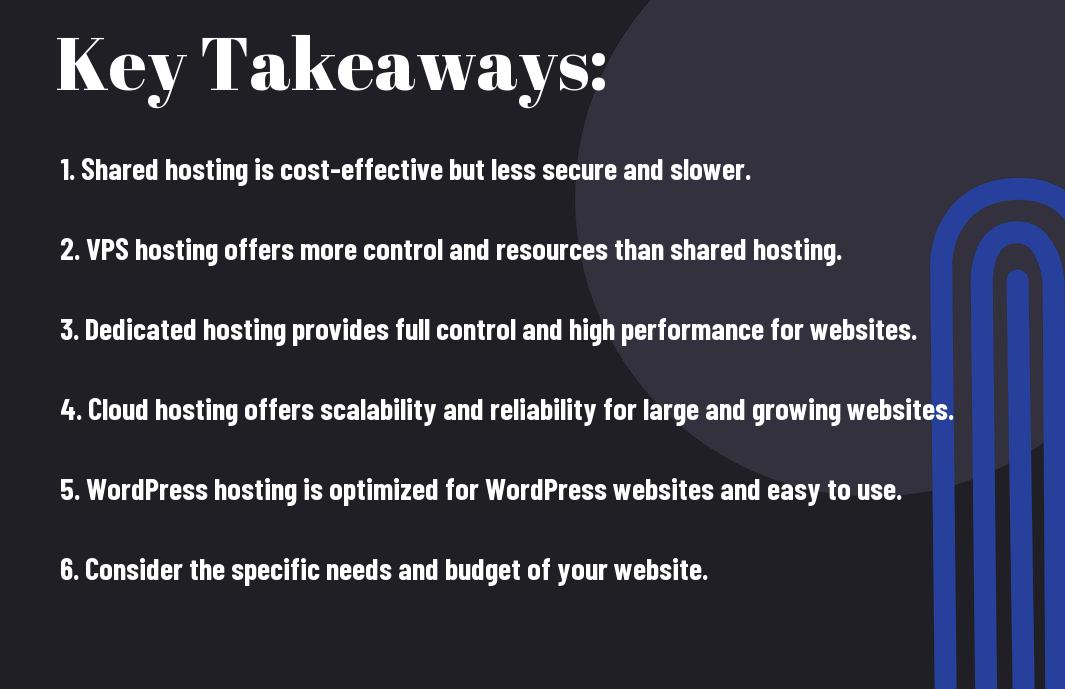Are you struggling to find the right web hosting plan for your website? Understanding the different types of web hosting plans is crucial to ensuring that you choose the best option for your needs. From shared hosting to dedicated servers, each type of web hosting plan has its own set of benefits and limitations. In this informative blog post, we will break down the key features of each type of web hosting plan, as well as the pros and cons of each option. By the end of this article, you will have a clear understanding of the different types of web hosting plans, allowing you to make an informed decision for your website’s hosting.
Key Takeaways:
- Shared hosting: Ideal for small businesses and blogs with low to moderate traffic, as it involves sharing server resources with other websites.
- VPS hosting: Offers greater scalability and control over resources, making it suitable for growing businesses and high-traffic websites.
- Dedicated hosting: Provides the highest level of performance and security, making it perfect for large enterprises and e-commerce websites with heavy traffic.

Shared Web Hosting
Obviously, when it comes to web hosting, shared hosting is one of the most popular options for those just starting out with a website. This type of hosting involves sharing a server with other websites, which can make it a more affordable option for you. If you want to learn more about the different types of web hosting, you can check out this article on TechRadar.
Advantages and Disadvantages of Shared Hosting
One of the main advantages of shared hosting is its affordability, making it a great option for those on a tight budget. You also don’t have to worry about server maintenance, as the hosting provider takes care of that. However, since you are sharing server resources with other websites, if one of them experiences a spike in traffic, it can slow down your site as well. Security can also be a concern as the actions of other websites on the server can affect yours.
Best Use Cases for Shared Hosting
Shared hosting is ideal for small businesses, personal websites, and blogs that don’t expect huge amounts of traffic. If you are just starting out and don’t have a lot of technical knowledge, shared hosting can be a good option as it is often managed, meaning the hosting provider takes care of the technical aspects for you.

Virtual Private Server (VPS) Hosting
Unlike shared hosting, VPS hosting provides you with your own virtual space within a larger physical server. This means that you have more control and flexibility over your hosting environment, as well as increased security and performance.
Understanding VPS Hosting Configuration
With VPS hosting, you have the ability to configure your server environment to meet your specific needs. You can install custom software, allocate resources, and make other adjustments to optimize your website’s performance. This level of control is particularly beneficial for businesses with unique hosting requirements.
Comparing VPS to Other Hosting Plans
When comparing VPS hosting to other hosting plans, it’s important to consider the differences in performance, scalability, and cost. Here’s a breakdown of how VPS hosting compares to shared hosting and dedicated hosting:
Comparison of VPS Hosting
| Aspect | VPS Hosting |
| Performance | Offers better performance than shared hosting and can be comparable to dedicated hosting. |
| Scalability | Allows for easy scalability, enabling you to upgrade resources as your website grows. |
| Cost | Costs more than shared hosting but is more affordable than dedicated hosting. |
This will help you make an informed decision about the best hosting plan for your website.
Dedicated Server Hosting
After understanding shared and VPS hosting, it’s time to explore dedicated server hosting. This type of hosting involves the use of an entire server for your website. It provides you with the highest level of performance, security, and control. In this type of hosting, you don’t share resources with other websites, giving you the ability to customize the server to meet your specific needs. To learn more about different web hosting plans, you can also refer to resources like The Ultimate Guide To Web Hosting.
Benefits of Opting for a Dedicated Server
When you opt for a dedicated server hosting plan, you gain complete control over the server, allowing you to configure it according to your requirements. This means you can install any software and applications that are necessary for your website’s performance. Additionally, dedicated server hosting provides you with unparalleled security, as you are not sharing the server with other websites. This reduces the risk of malware or security breaches. Furthermore, you can expect reliable and high performance, as you won’t experience slowdowns due to other websites utilizing the server’s resources.
Scenarios Where Dedicated Hosting is Ideal
If your website experiences high traffic or requires extensive resources, dedicated server hosting is ideal for you. This type of hosting is also recommended if you handle sensitive data or require strict compliance with data privacy regulations. Moreover, if you need to customize the server for specific applications or software, dedicated hosting is the best choice. By opting for a dedicated server, you ensure that your website operates at its best, regardless of the demands placed on it.
Cloud Hosting
Keep in mind that cloud hosting is a type of web hosting that uses multiple virtual servers to host your website. This means that your website is not tied to a single server, but rather to a network of servers. This allows for greater flexibility and scalability, as well as improved reliability and security.
Exploring the Scalability of Cloud Hosting
When it comes to scalability, cloud hosting offers you the ability to easily scale your resources up or down as needed. This means that if you experience a sudden surge in traffic to your website, you can easily allocate more resources to handle the increased load. On the flip side, if your traffic decreases, you can scale back your resources to avoid overspending. This level of flexibility is one of the key benefits of cloud hosting and can be extremely valuable for websites with fluctuating traffic patterns.
Cost Considerations and Performance
When considering the cost of cloud hosting, it’s important to remember that you only pay for the resources you use. This means that if your website experiences a spike in traffic, you may end up paying more for additional resources. However, the performance benefits of cloud hosting, including improved uptime and faster load times, can make it a worthwhile investment. Additionally, the ability to easily scale your resources can help you avoid overpaying for unused capacity.
Managed Hosting and Specialty Hosting Plans
Despite the wide range of hosting options available, managed hosting and specialty hosting plans offer unique benefits tailored to specific needs. To learn more about these plans, you can refer to A Detailed Guide to Different Types of Web Hosting.
The Convenience of Managed Hosting Services
Managed hosting services offer the convenience of having the technical aspects of your website managed by the hosting provider. This includes server maintenance, security updates, and technical support. With managed hosting, you can focus on creating and managing your website content, while the hosting provider takes care of the backend technicalities. This can be particularly beneficial if you have limited technical expertise or time to dedicate to managing your hosting infrastructure. However, it’s important to carefully review the specific services included in a managed hosting plan to ensure it meets your needs.
Niche-Specific Hosting Solutions
Niche-specific hosting solutions cater to specific types of websites or applications, such as e-commerce, WordPress, or cloud hosting. These specialty hosting plans are designed to optimize the performance and security of websites in particular niches, offering features and support tailored to the specific requirements of those platforms. If you have a website with unique needs or specific technical requirements, opting for a niche-specific hosting solution can provide you with the specialized support and resources necessary for the success of your online presence. However, it’s crucial to thoroughly research and compare different niche-specific hosting providers to ensure you select the best fit for your website.
Understanding the Different Types of Web Hosting Plans
So now that you have a better understanding of the different types of web hosting plans available, you can make a more informed decision about which one best fits your needs. Whether you are looking for shared hosting for a personal blog or a dedicated server for a high-traffic e-commerce site, knowing the differences between plans will help you choose the right one for your specific requirements. Remember to consider factors like storage space, bandwidth, security features, and customer support when making your decision. By taking the time to understand the various options, you can ensure that you select a web hosting plan that will help your website succeed.
FAQ
Q: What are the different types of web hosting plans?
A: The different types of web hosting plans include shared hosting, VPS hosting, dedicated server hosting, and cloud hosting.
Q: What is shared hosting?
A: Shared hosting is a type of web hosting where multiple websites are hosted on the same server, sharing its resources such as CPU, disk space, and memory.
Q: What is VPS hosting?
A: VPS hosting, or Virtual Private Server hosting, uses virtualization technology to provide each website with its own dedicated resources within a shared server environment.
Q: What is dedicated server hosting?
A: Dedicated server hosting involves the use of an entire physical server dedicated to a single website or organization, providing full control and access to the server’s resources.
Q: What is cloud hosting?
A: Cloud hosting utilizes a network of virtual servers to deliver resources as a service over the internet, offering scalability and flexibility for websites with varying resource needs.
CATEGORY:Web Hosting

